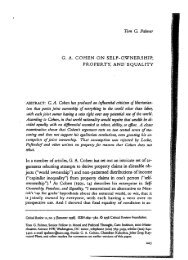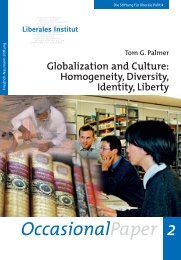Are Patents and Copyrights Morally Justified? - Tom G. Palmer
Are Patents and Copyrights Morally Justified? - Tom G. Palmer
Are Patents and Copyrights Morally Justified? - Tom G. Palmer
You also want an ePaper? Increase the reach of your titles
YUMPU automatically turns print PDFs into web optimized ePapers that Google loves.
No. 3] <strong>Are</strong> <strong>Patents</strong> <strong>and</strong> <strong>Copyrights</strong> <strong>Morally</strong> <strong>Justified</strong>? 887<br />
A superficially similar, but in reality very different argument<br />
based on personality, is offered by Hegel in his Philosophy of<br />
Right. 78 Unlike von Humboldt’s appeal to the development of<br />
personality, the Hegelian argument sees property not only as a<br />
necessary condition for this development, but as the manifestation<br />
of this development itself. In the Phenomenology of Spirit,<br />
Hegel emphasized that it is through work that the spirit comes<br />
to know itself. 79 In the Philosophy of Right, a treatise on law,<br />
property fills the role of work. Notably, the discussion ofproperty<br />
culminates in patents <strong>and</strong> copyrights. For Hegel, personality<br />
forms the foundation of any system of rights: “Personality<br />
essentially involves the capacity for rights <strong>and</strong> constitutes the<br />
concept <strong>and</strong> the basis (itselfabstract) of the system ofabstract<br />
<strong>and</strong> therefore formal right. Hence the imperative of right is:<br />
‘Be a person <strong>and</strong> respect others as persons.’ “80<br />
Personality must be translated from mere potentiality into<br />
actuality, or, in Hegelian terms, from Concept (Begrij) to Idea<br />
(Idee).<br />
A person must translate his freedom into an external<br />
sphere in order to exist as Idea. Personality is the first, still<br />
wholly abstract, determination of the absolute <strong>and</strong> infinite<br />
will, <strong>and</strong> therefore this sphere distinct from the person, the<br />
sphere capable of embodying his freedom, is likewise determined<br />
as what is immediately different <strong>and</strong> separable from<br />
him. 8 ’<br />
Hegel specifically eschews utilitarianjustifications for property,<br />
for “[i}f emphasis is placed on my needs, then the possession<br />
of property appears as a means to their satisfaction, but<br />
the true position is that, from the st<strong>and</strong>point offreedom, property<br />
is the first embodiment of freedom <strong>and</strong> so is in itself a substantive<br />
end,” 82<br />
The metaphysical grounding of this theory of private property<br />
is straightforward: “Since my will, as the will of a person,<br />
78. See G. HECEL, Pnu.osopHv OF RIGHT (F. Knox trans. 1952).<br />
79. See G. HEGEL,, PHENOMENOLOGY OF SPIRIT (A.V. Miller trans. 1977).<br />
80. 0. HEGEL, supra note 78, at 87. Knox points to a similarity in the treatment of<br />
Bildung (loosely translatable as “education” or “spiritual development”) in both von<br />
Humboldt <strong>and</strong> Hegel. See id. at 815 n.58. The differenëeis that whereas von Humboldt<br />
saw the role of the state in the process of Bildung as “negative,” that is, protecting<br />
citizens from violence but otherwisekeeping out of the way, Hegel sees a positive role<br />
for the state in this process. See id.<br />
81. Id. at 40.<br />
82. Id. at 42.











